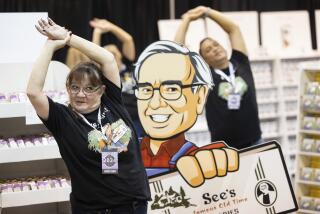Shaw Industries Soars on Berkshire Hathaway Purchase Offer
- Share via
DALTON, Ga. — Berkshire Hathaway Inc., the investment firm headed by billionaire Warren Buffett, has offered to buy Shaw Industries Inc., the world’s largest carpet maker, for about $2 billion, or $19 a share, in cash.
The news sent Shaw’s shares up $6.44, or 53%, to $18.63 on the New York Stock Exchange. Berkshire’s Class A shares dropped $1,250 to $58,000 and its Class B shares fell $35 to $1,910, also on the NYSE.
Shaw said its board has formed a committee of four directors to study the offer and to make a recommendation on whether to accept it.
Berkshire Hathaway offered to purchase between 80.1% and 86% of Shaw’s outstanding shares at $19 each, or about $1.9 billion to $2 billion, Shaw said. It would then have an option to buy additional shares beginning in March 2002.
Chairman and Chief Executive Robert E. Shaw and President Julian D. Saul, who have agreed to support the offer, would each keep his 5% stake in Shaw if the sale is completed.
Shaw would maintain its current management and headquarters under the offer.
Omaha, Neb.-based Berkshire declined to comment beyond the Shaw Industries’ statement.
“Shaw has been an exceptional performer. It’s a powerhouse company whose earnings are 10 times what they were 16 years ago,” said James Armstrong of private money manager Henry Armstrong Associates in Pittsburgh.
“Shaw is also one of only three dominant players in the market and it has excellent management,” Armstrong said. “That’s consistent with what Buffett likes.”
Shaw’s shares have lost more than half their value in the last 19 months due to higher oil prices, rising interest rates and a failed move into the retail carpet business.
“It’s a steal at the current price,” Wachovia Securities analyst Kay Norwood said.
Last month, Shaw agreed to pay $27.5 million to settle class-action civil lawsuits claiming the company conspired with rival Mohawk Industries Inc., based in Calhoun, Ga., to fix prices in the 1990s.
Both companies denied the charges, but said they had settled the cases separately to avoid further litigation costs.
More to Read
Inside the business of entertainment
The Wide Shot brings you news, analysis and insights on everything from streaming wars to production — and what it all means for the future.
You may occasionally receive promotional content from the Los Angeles Times.










